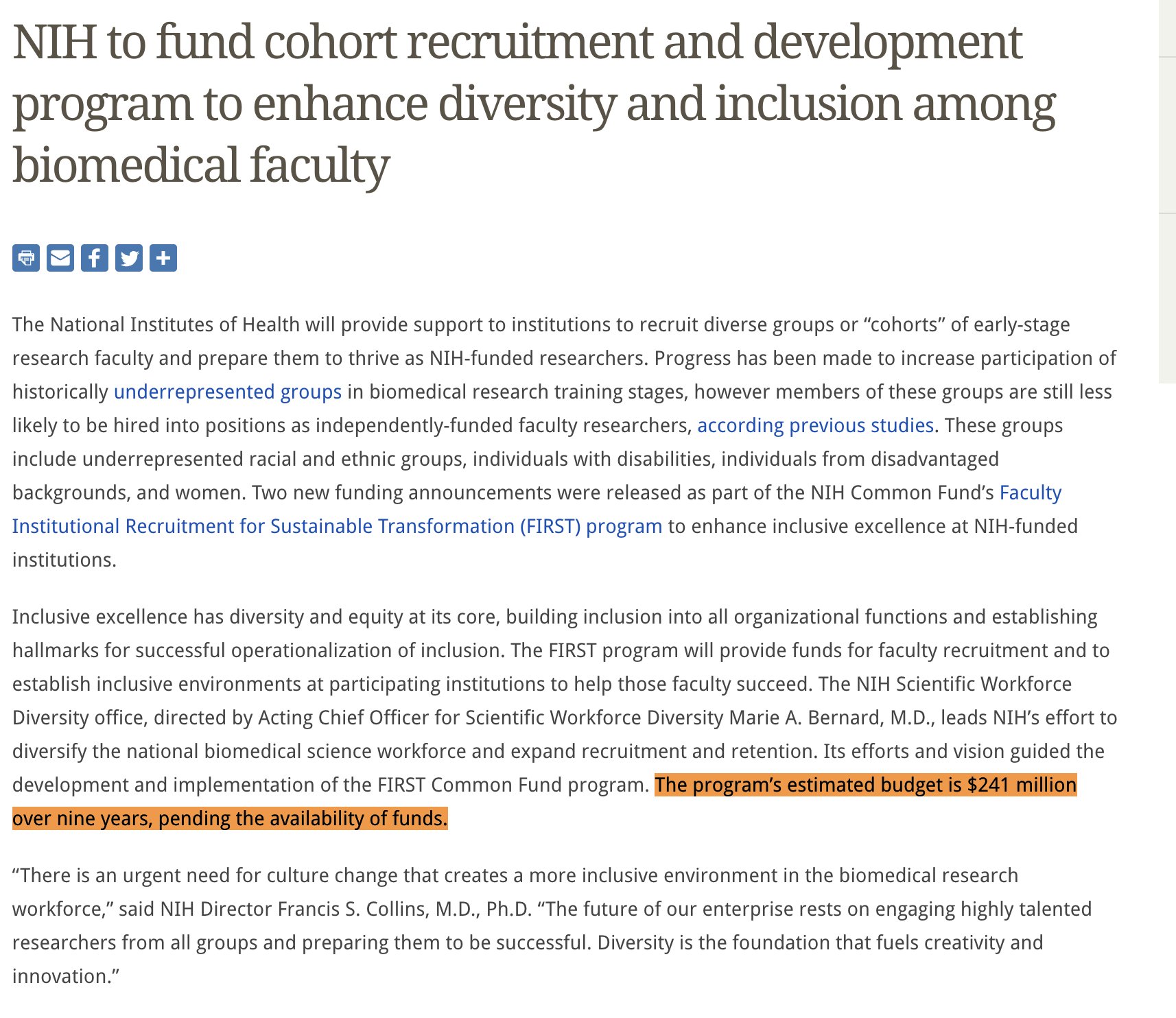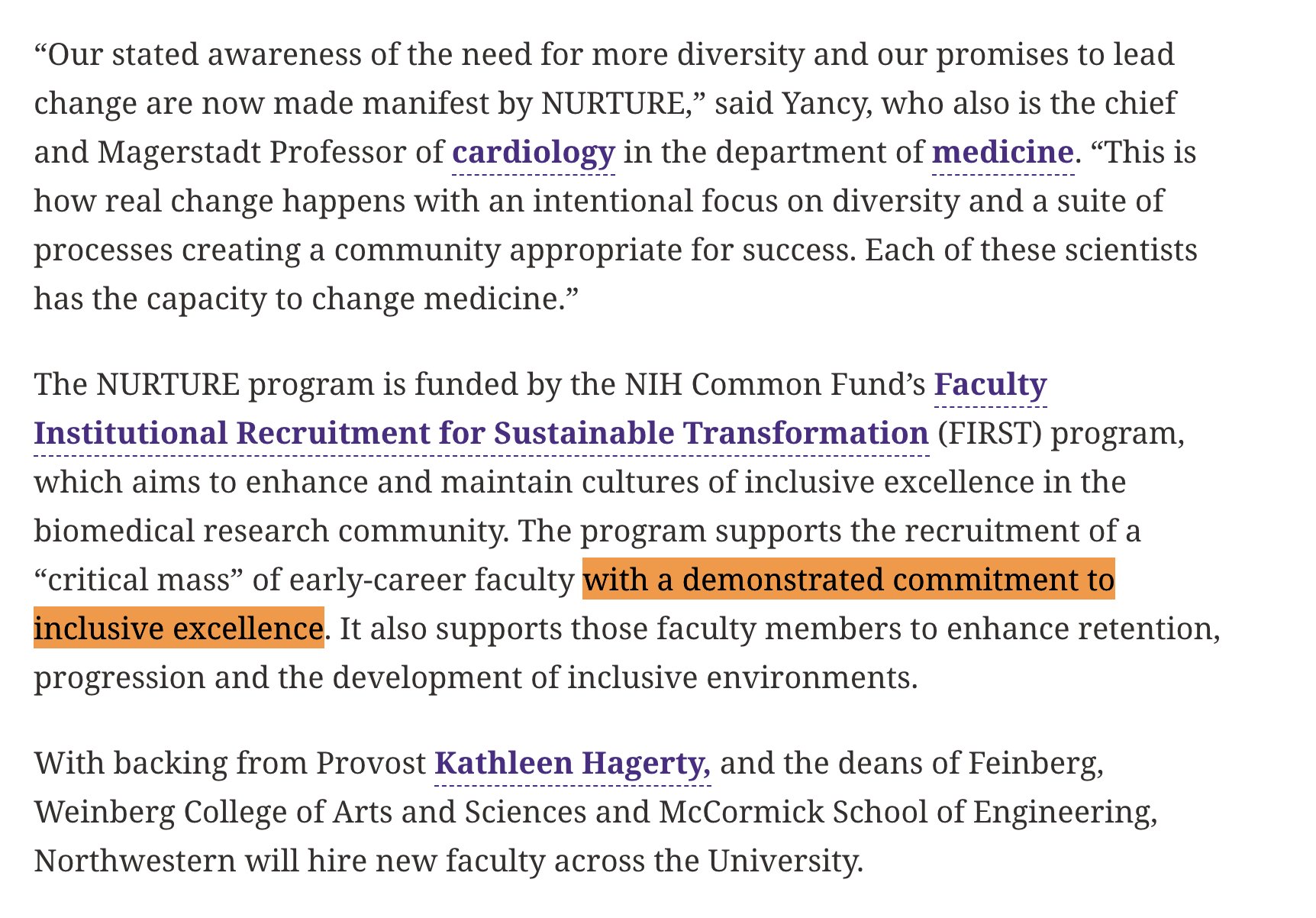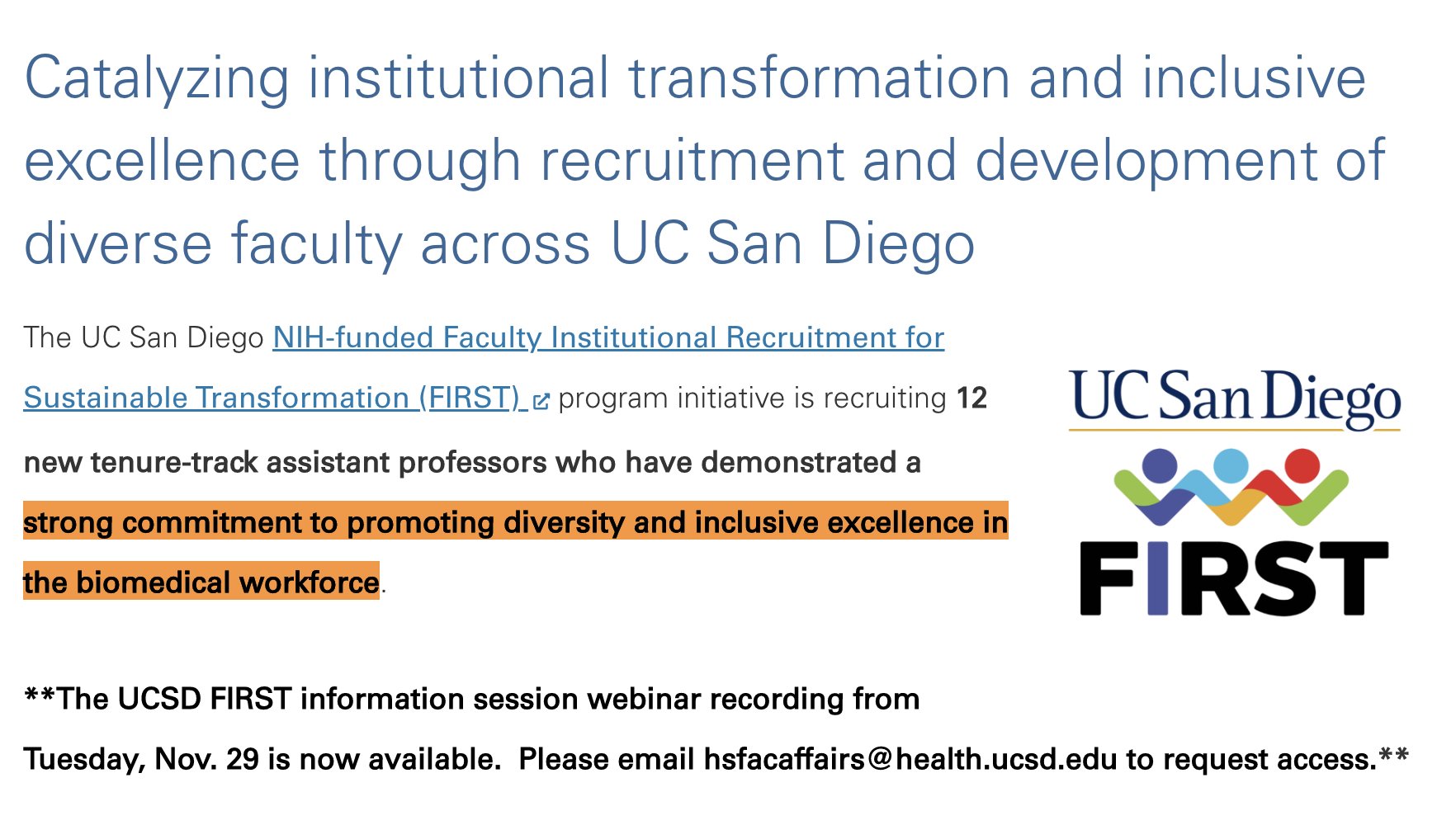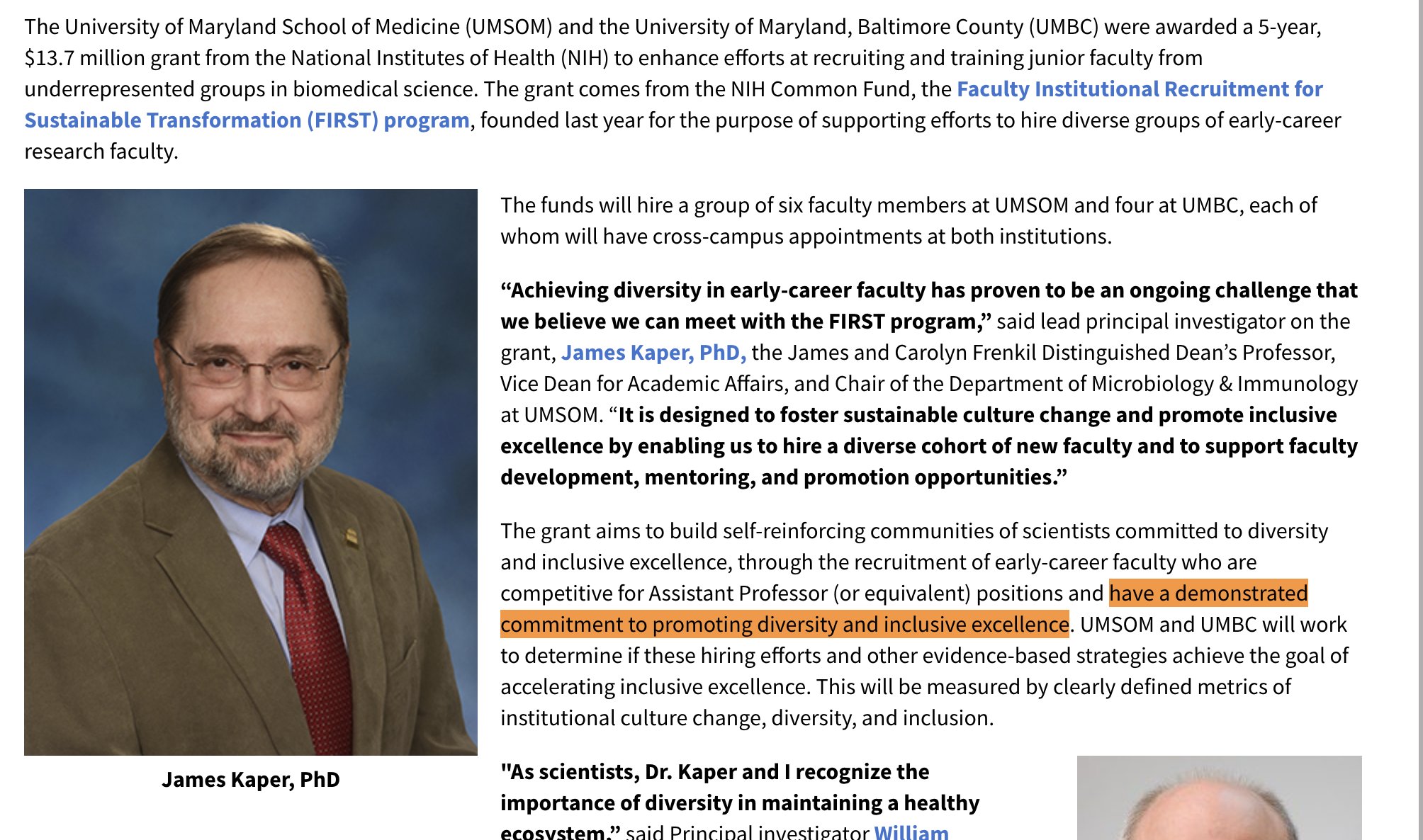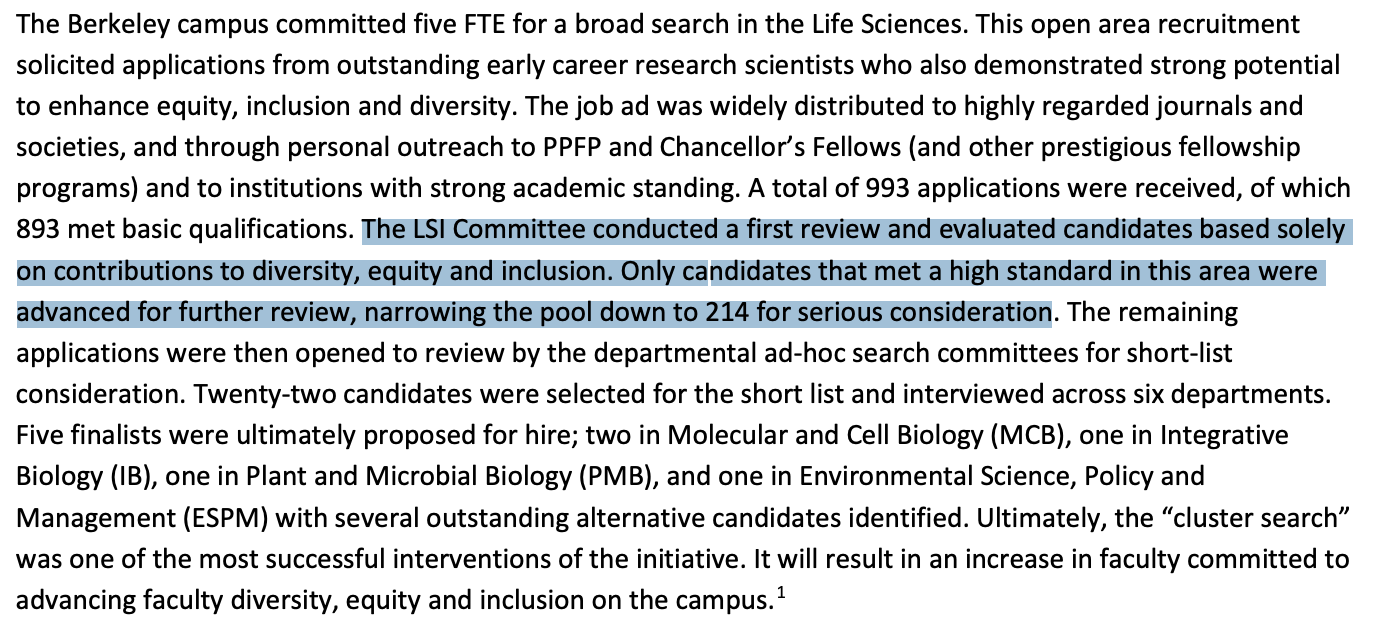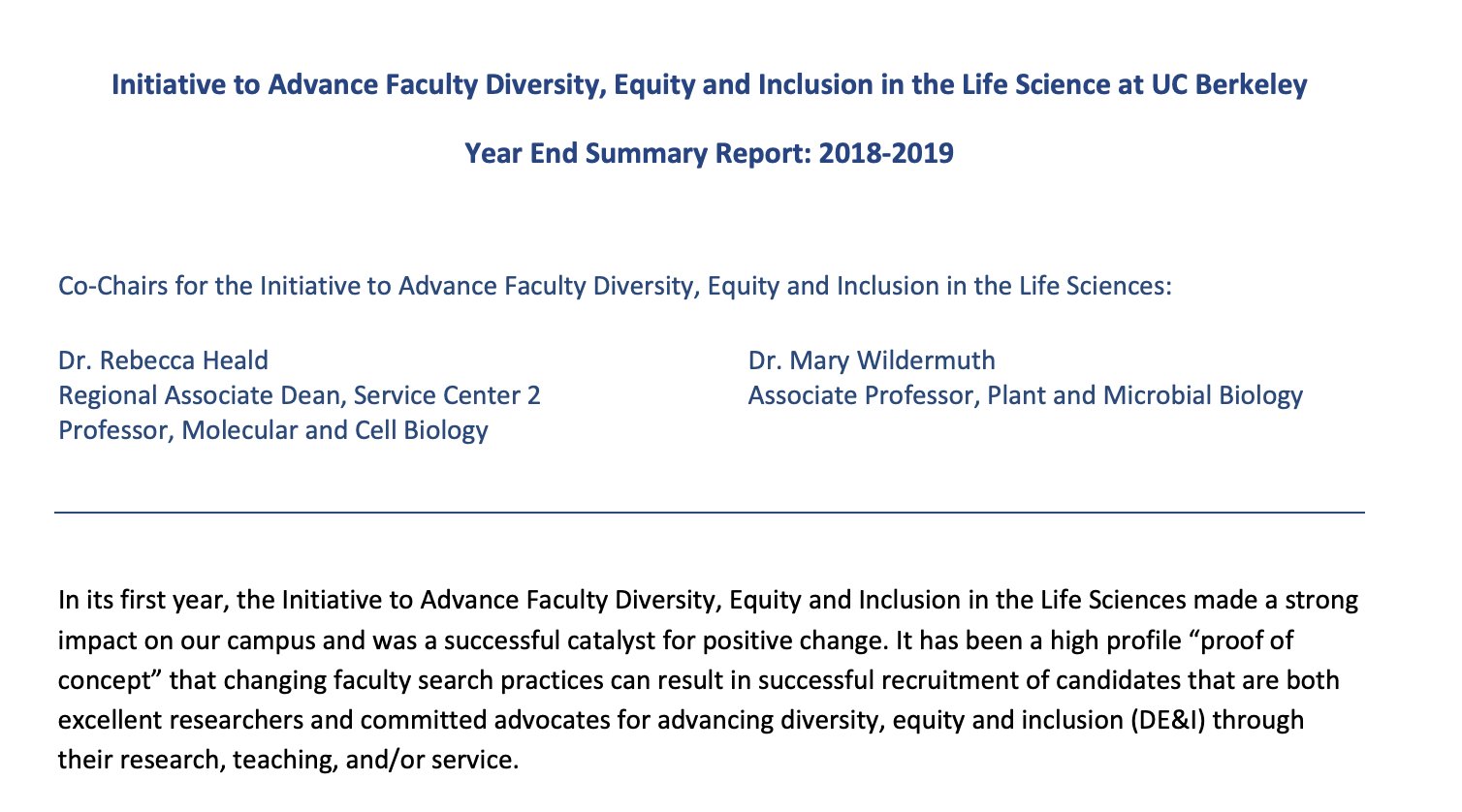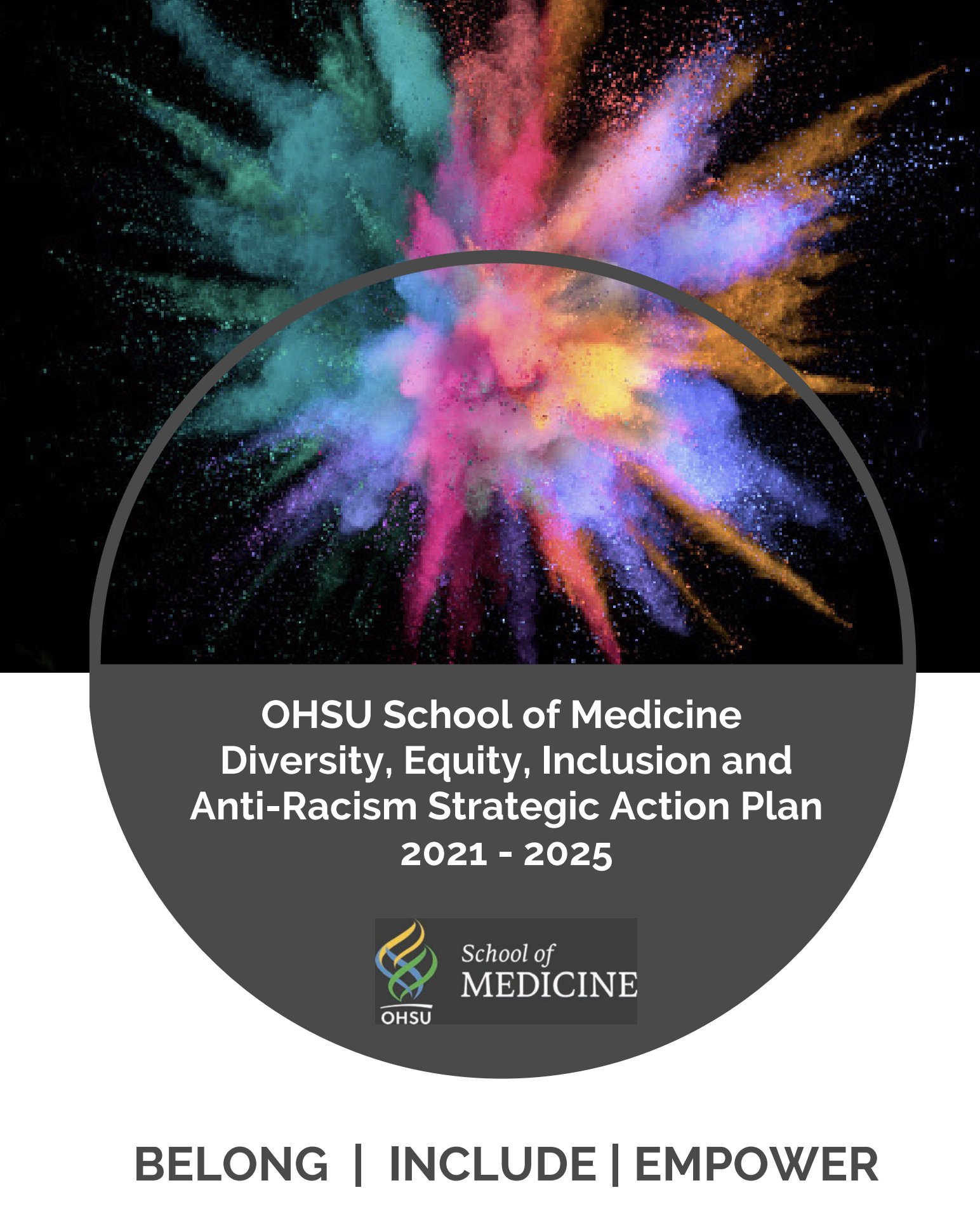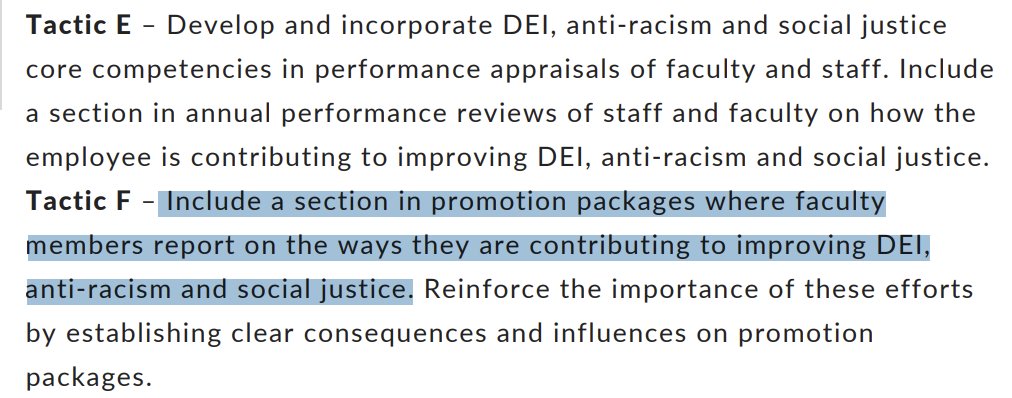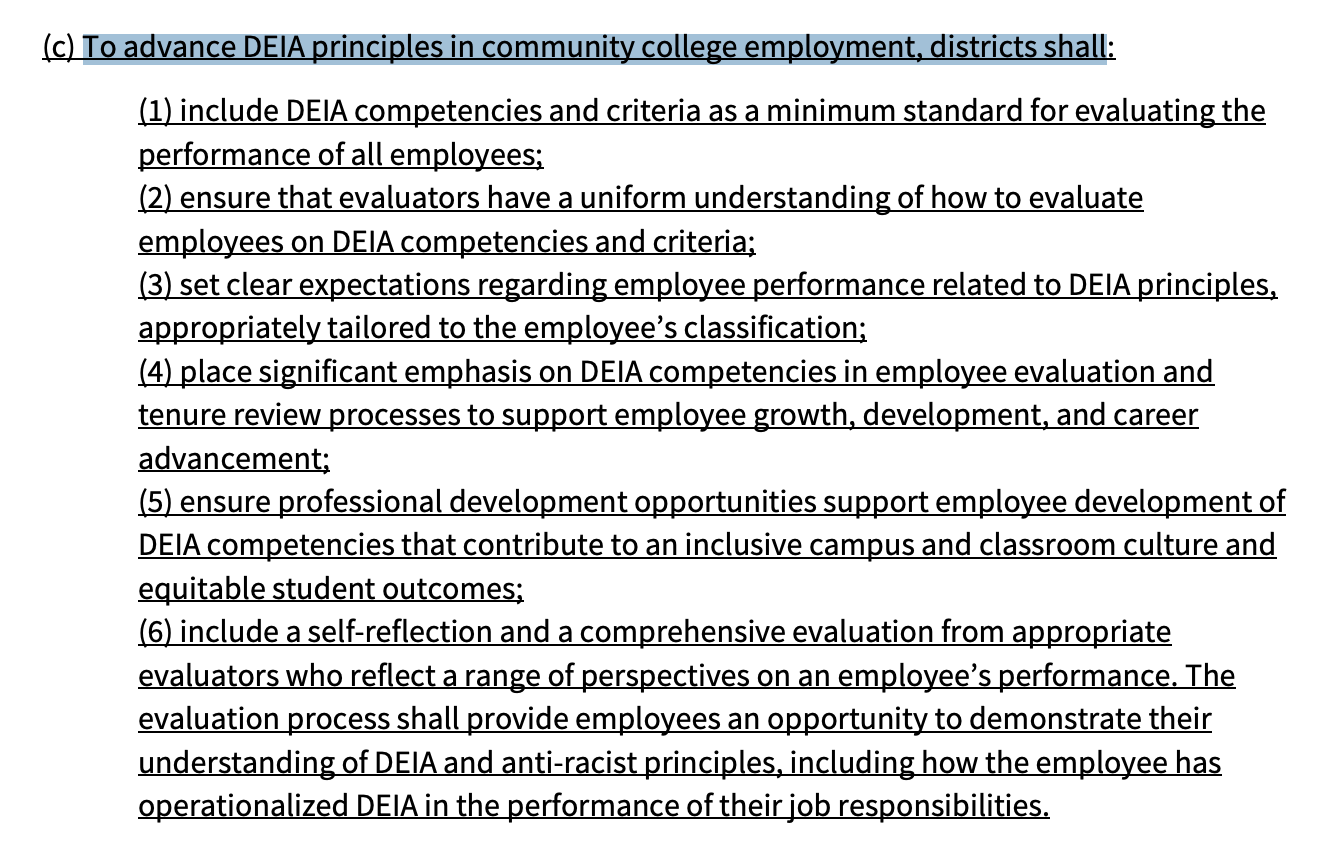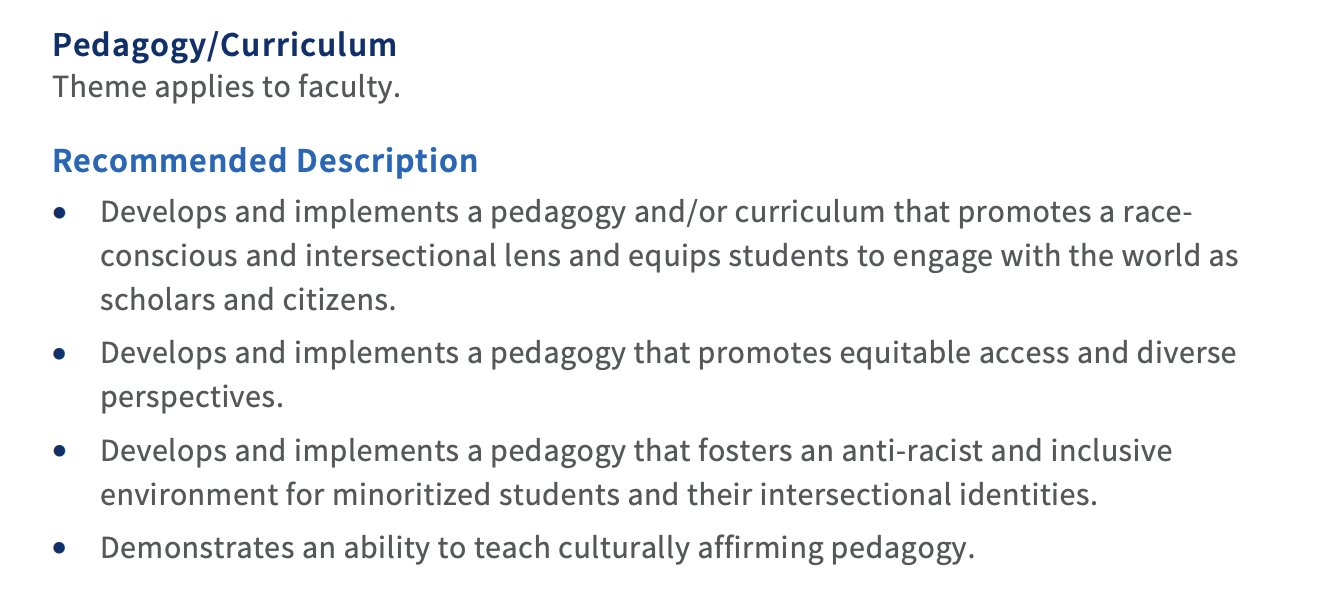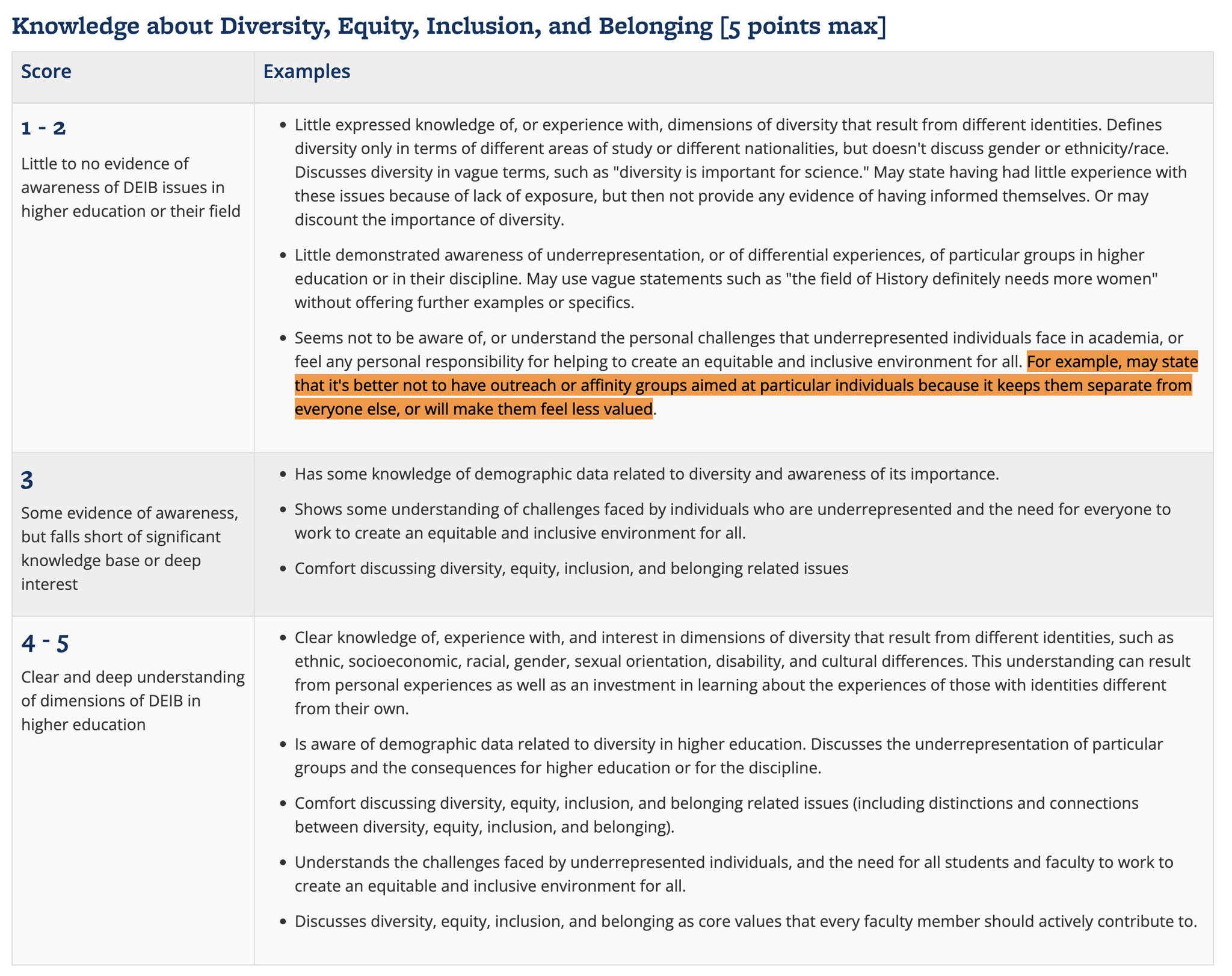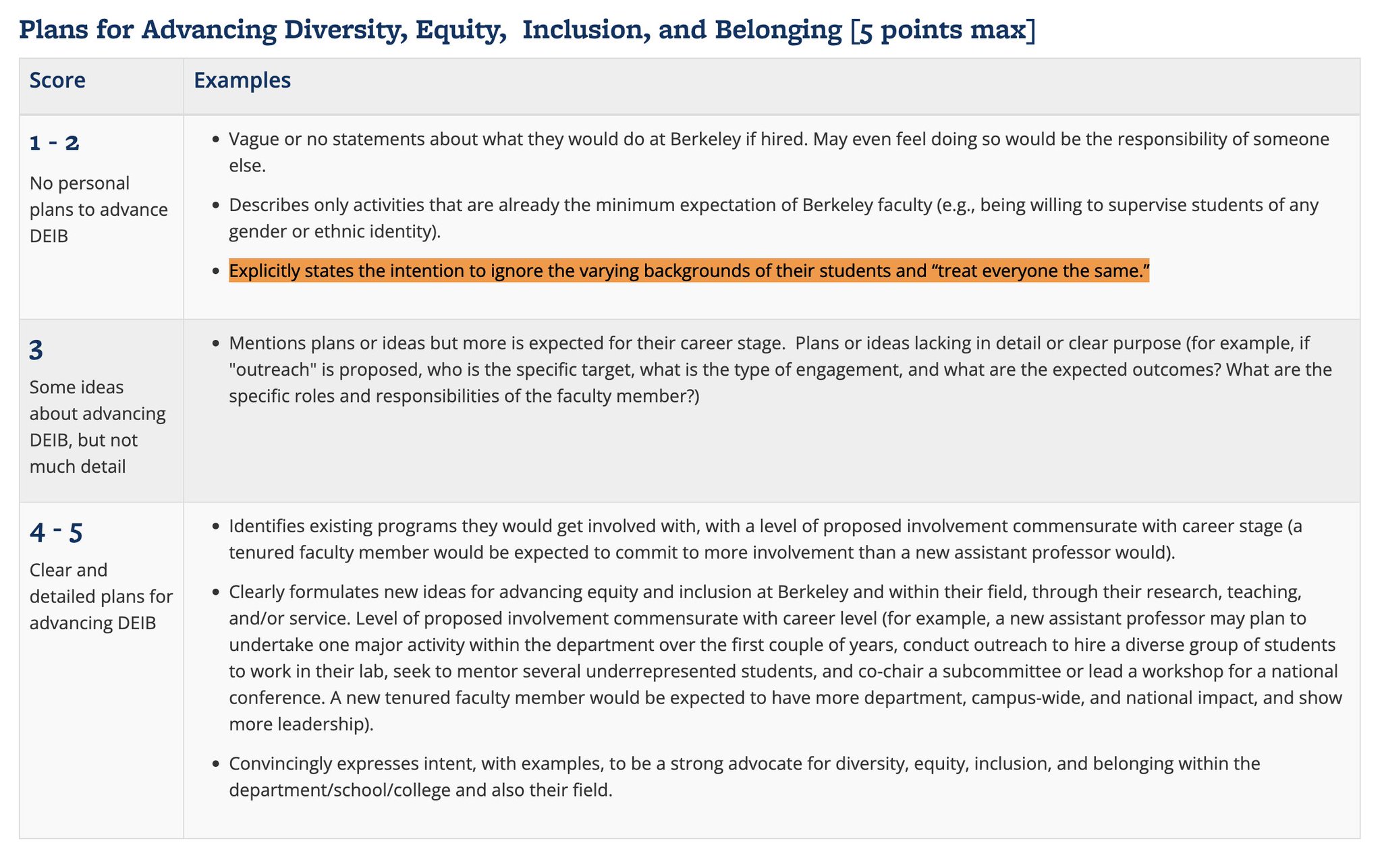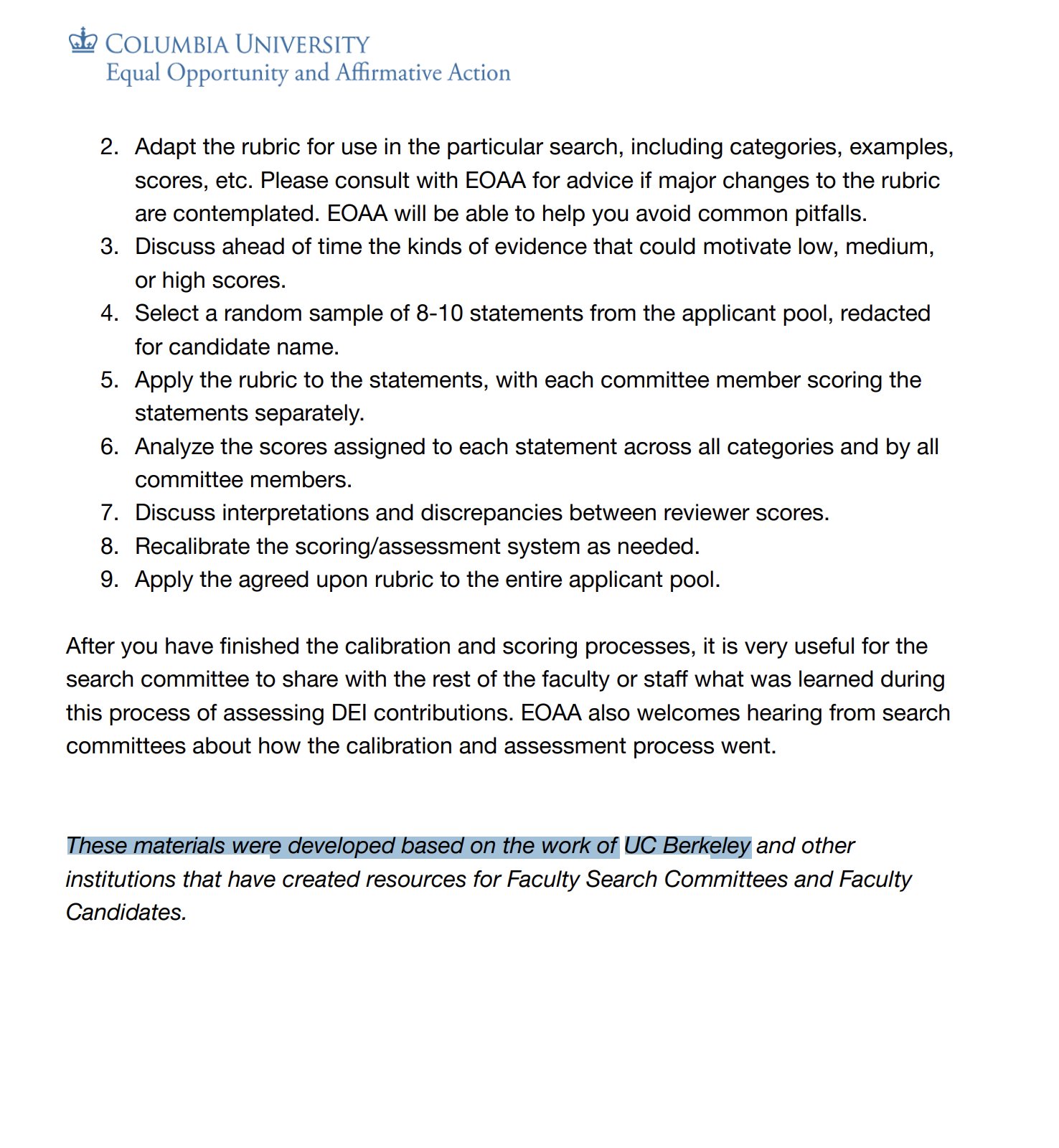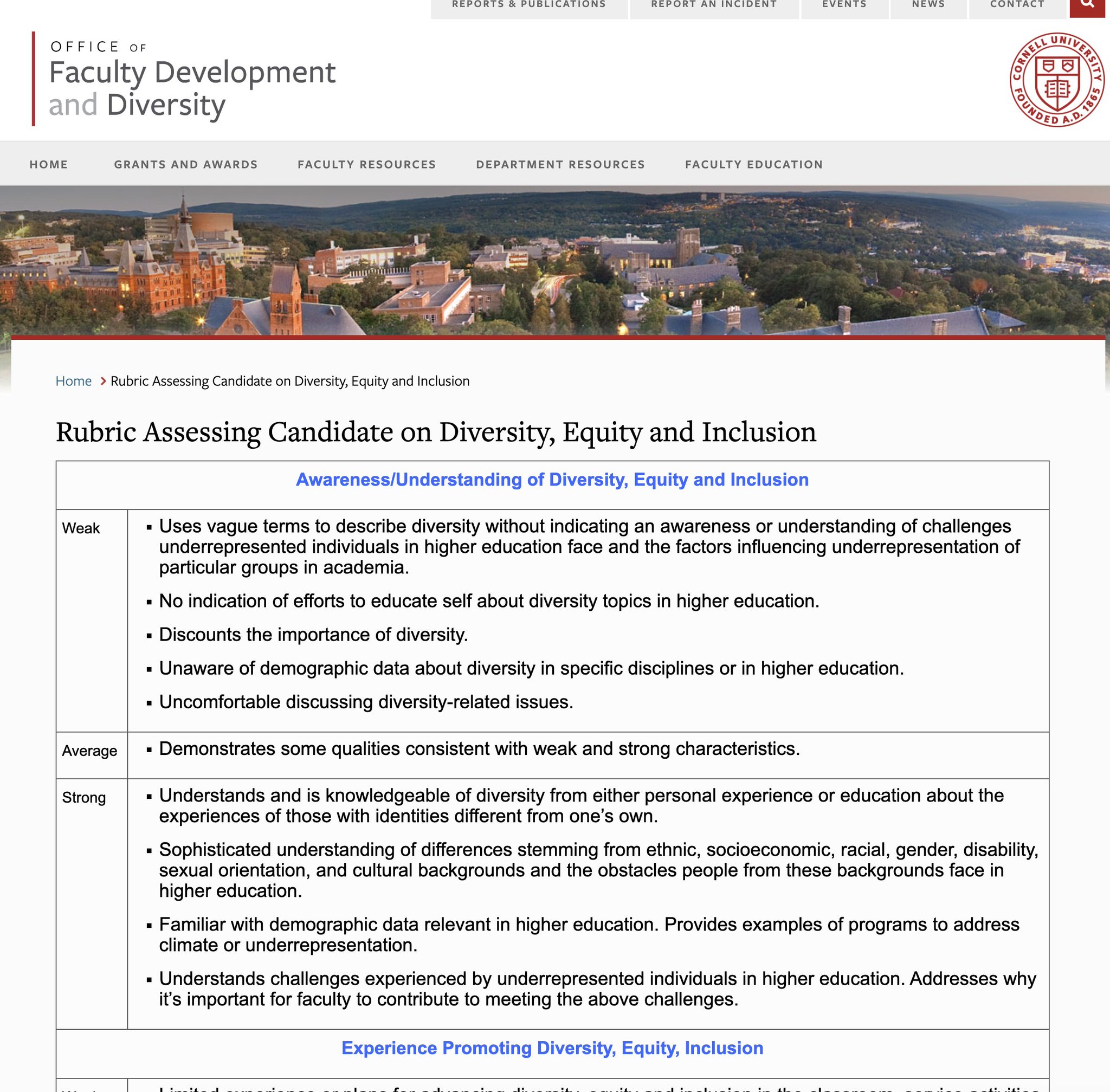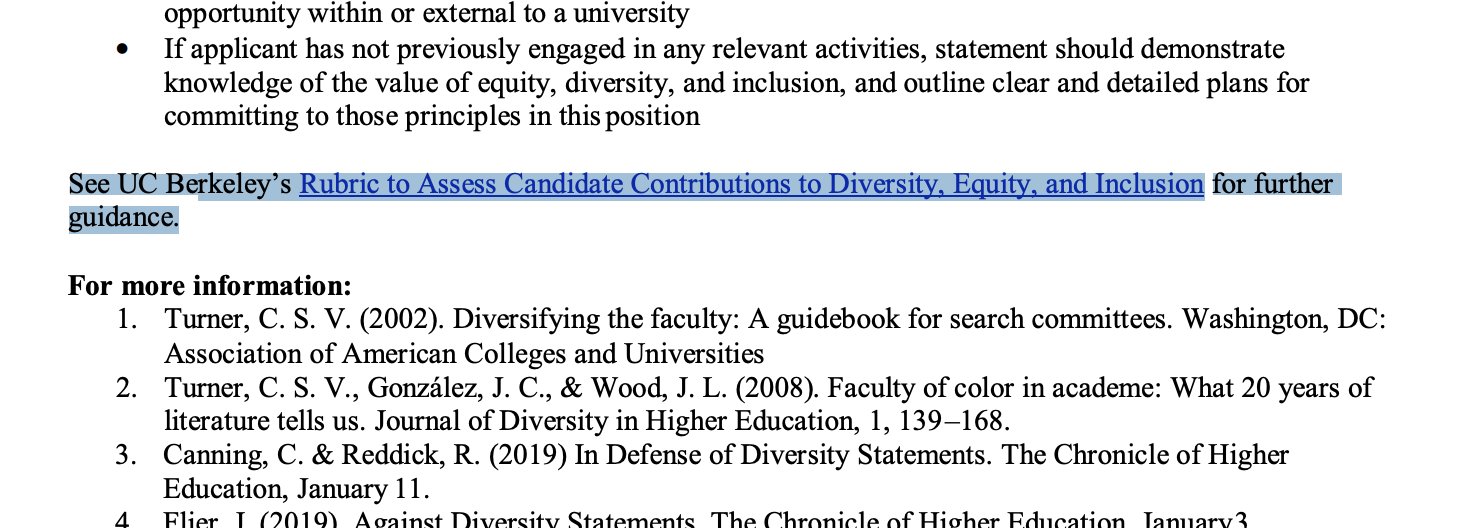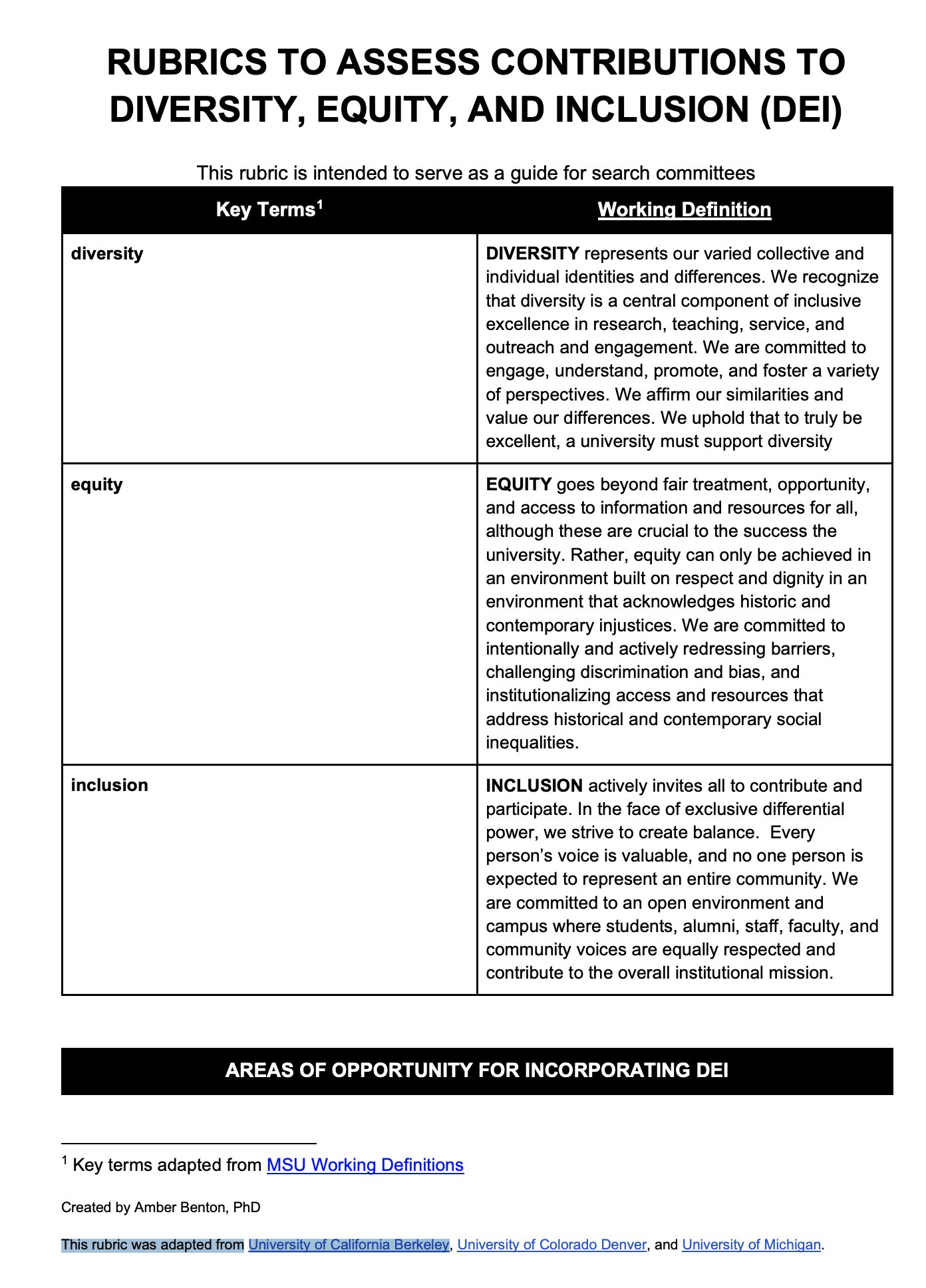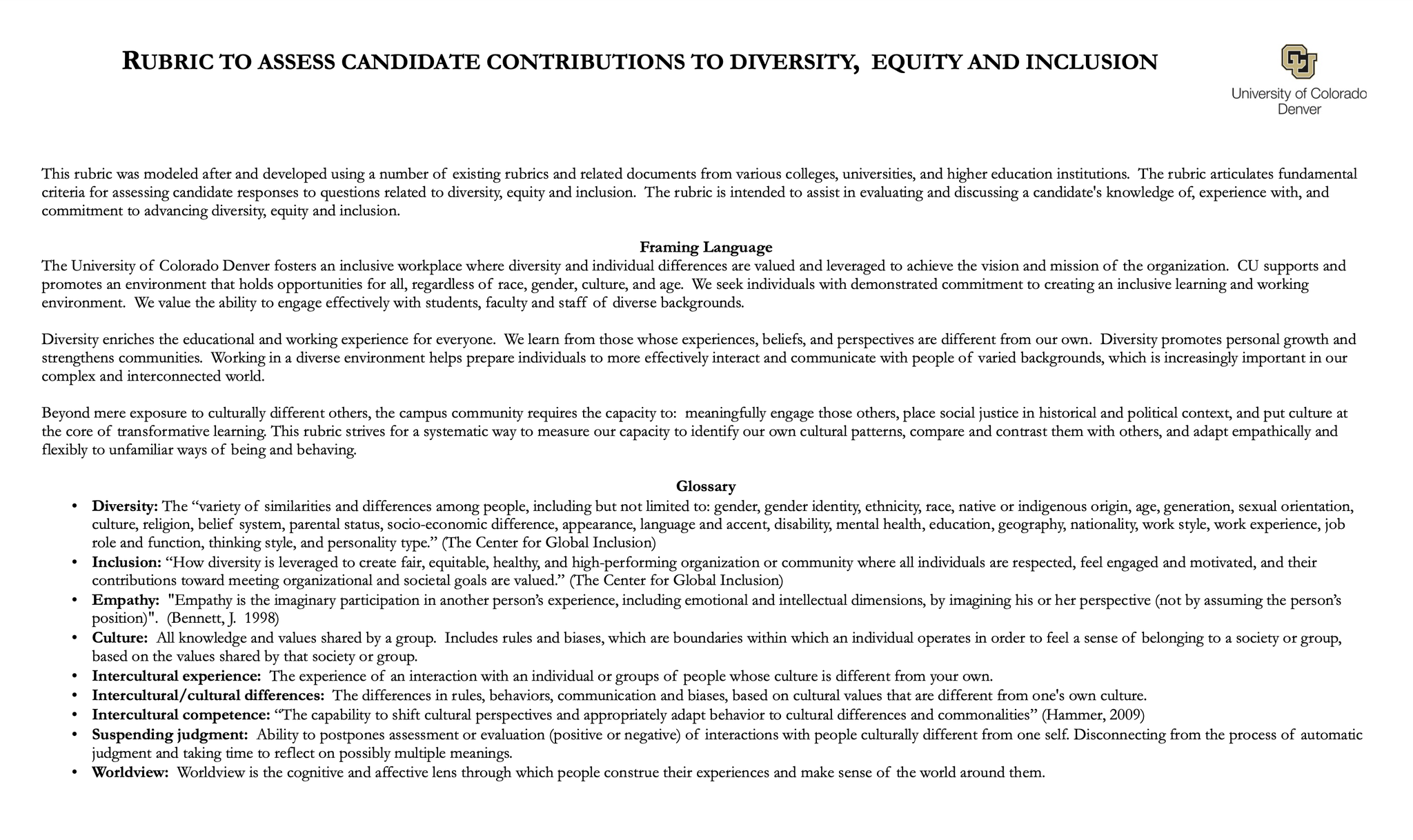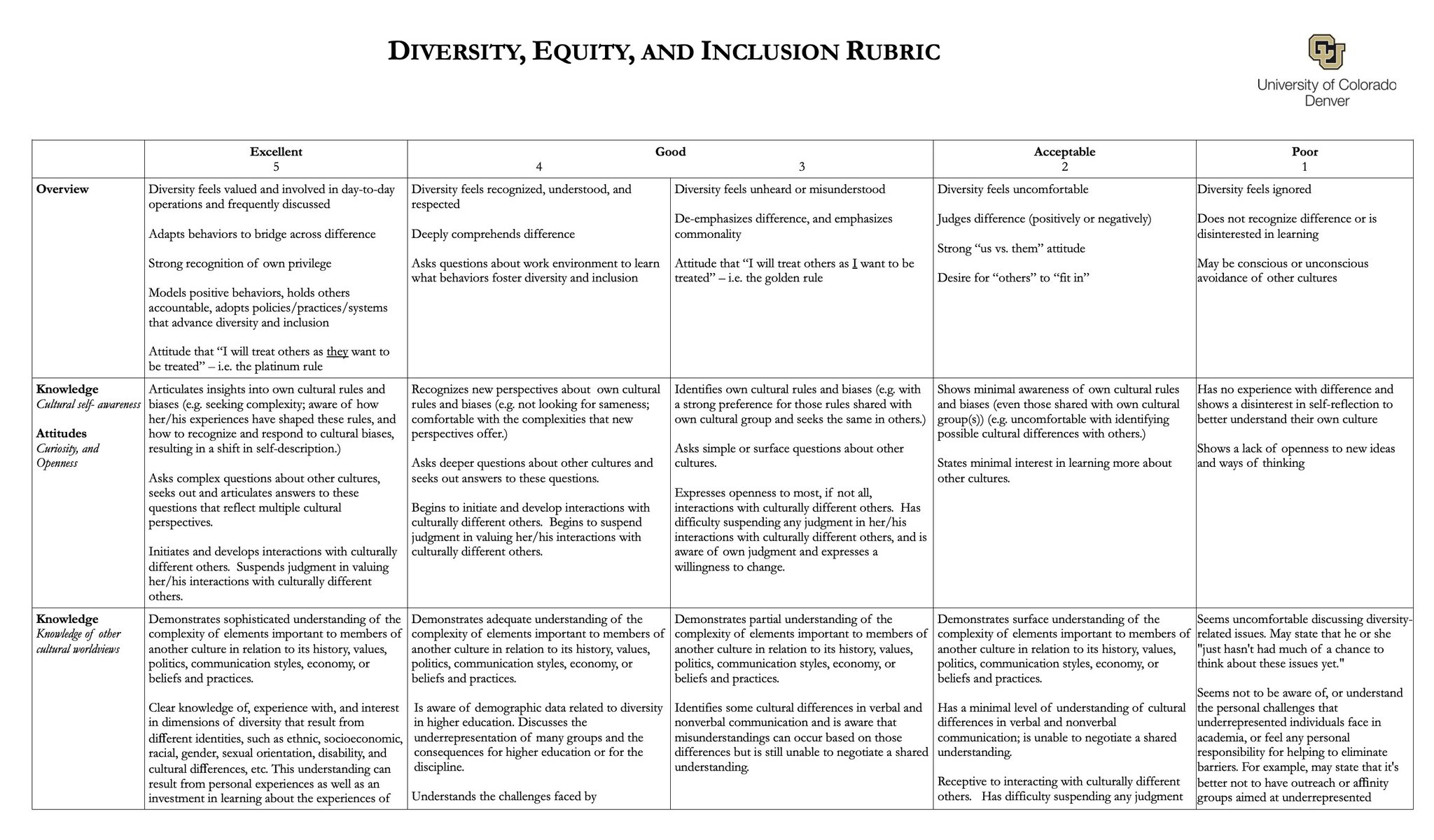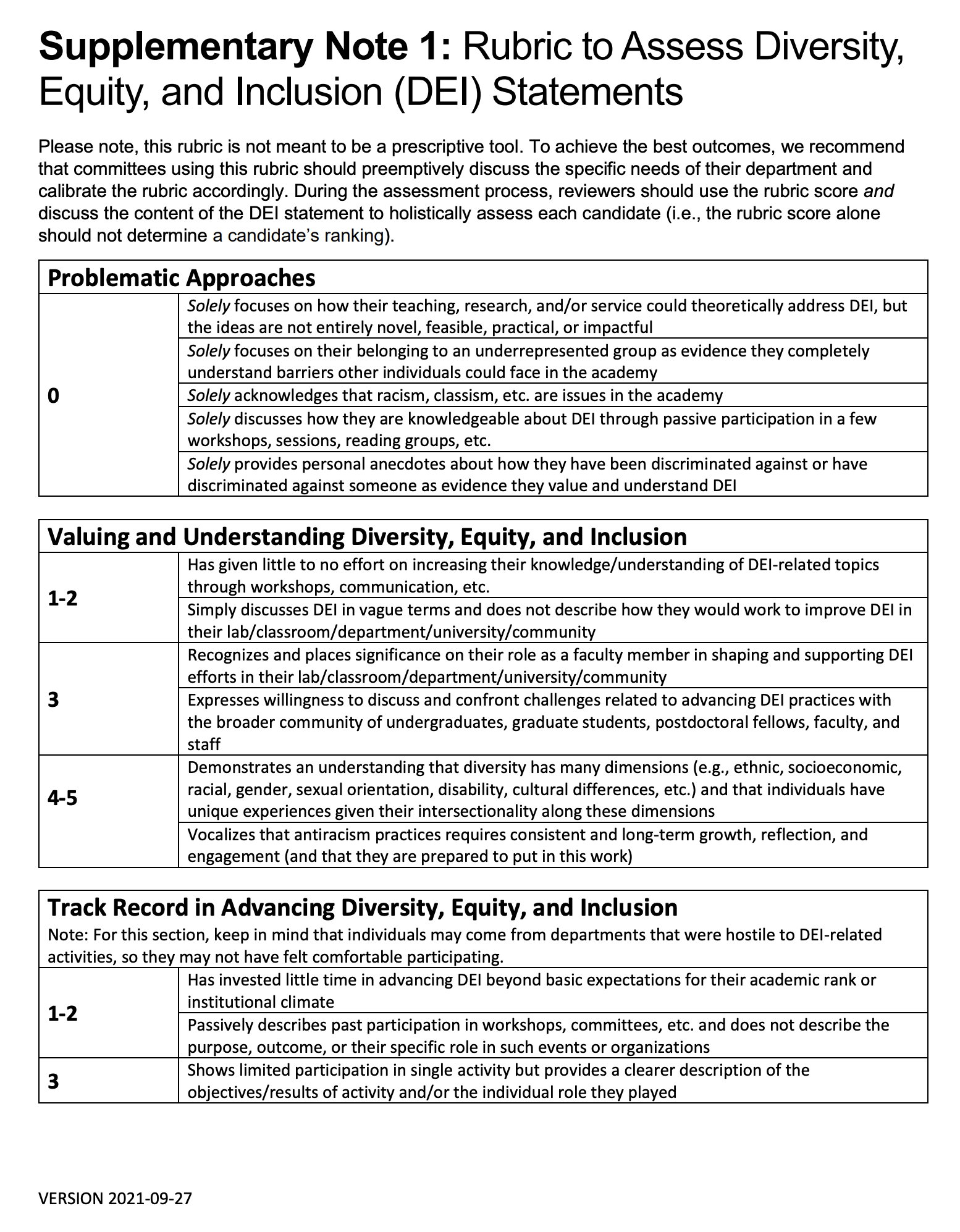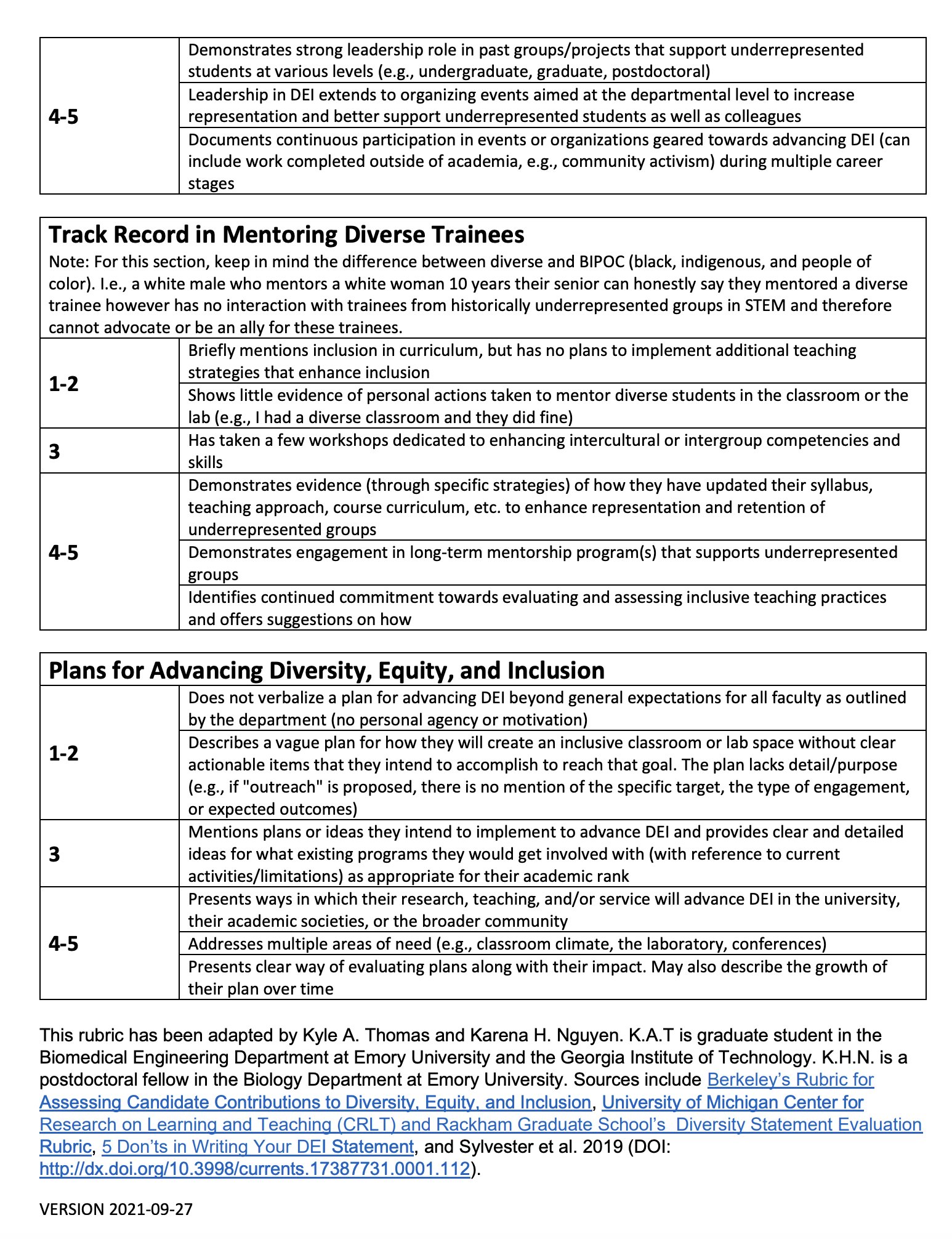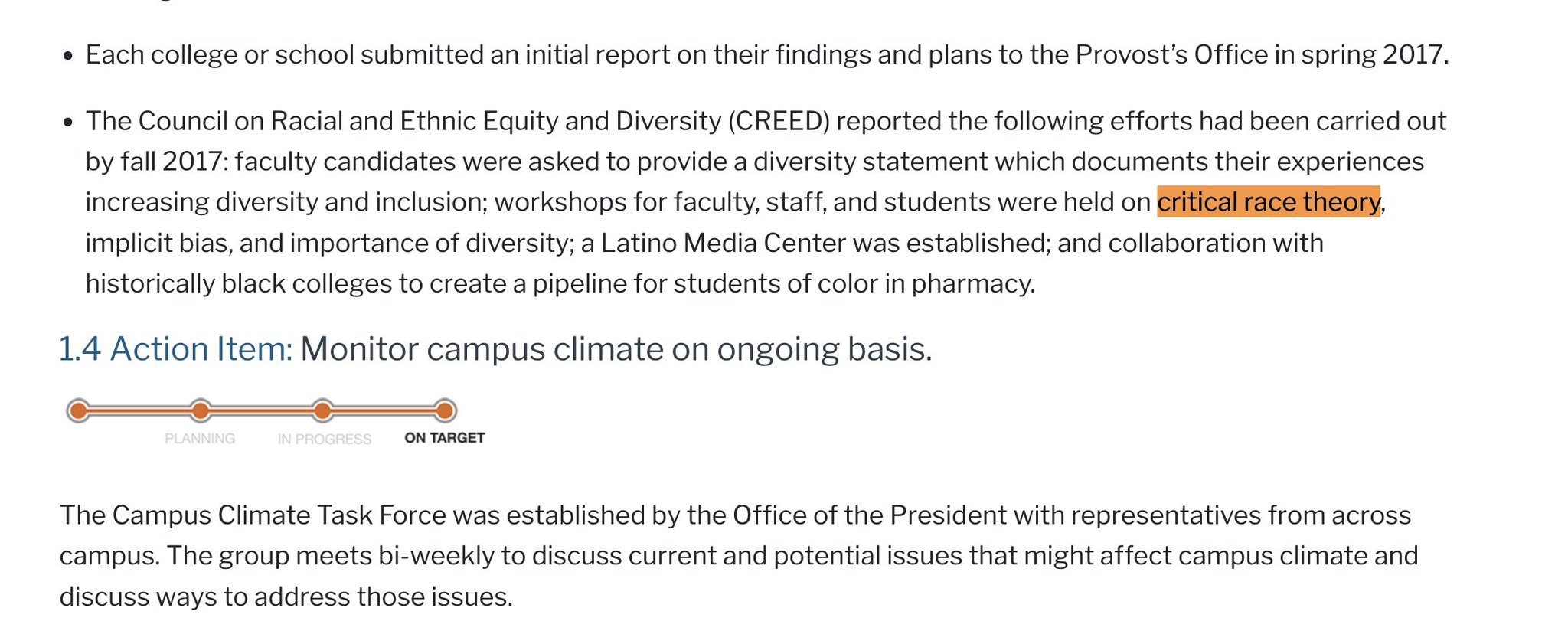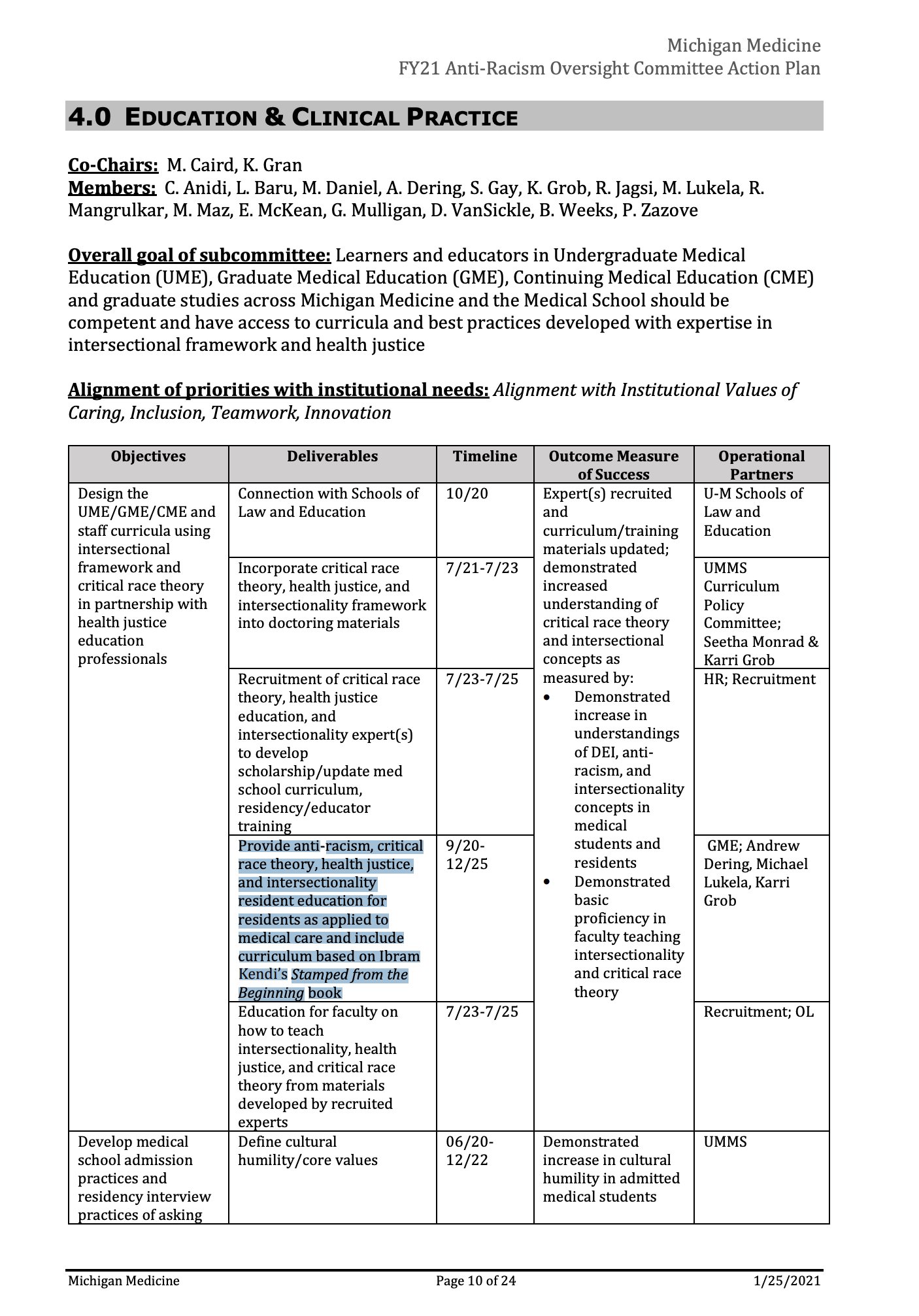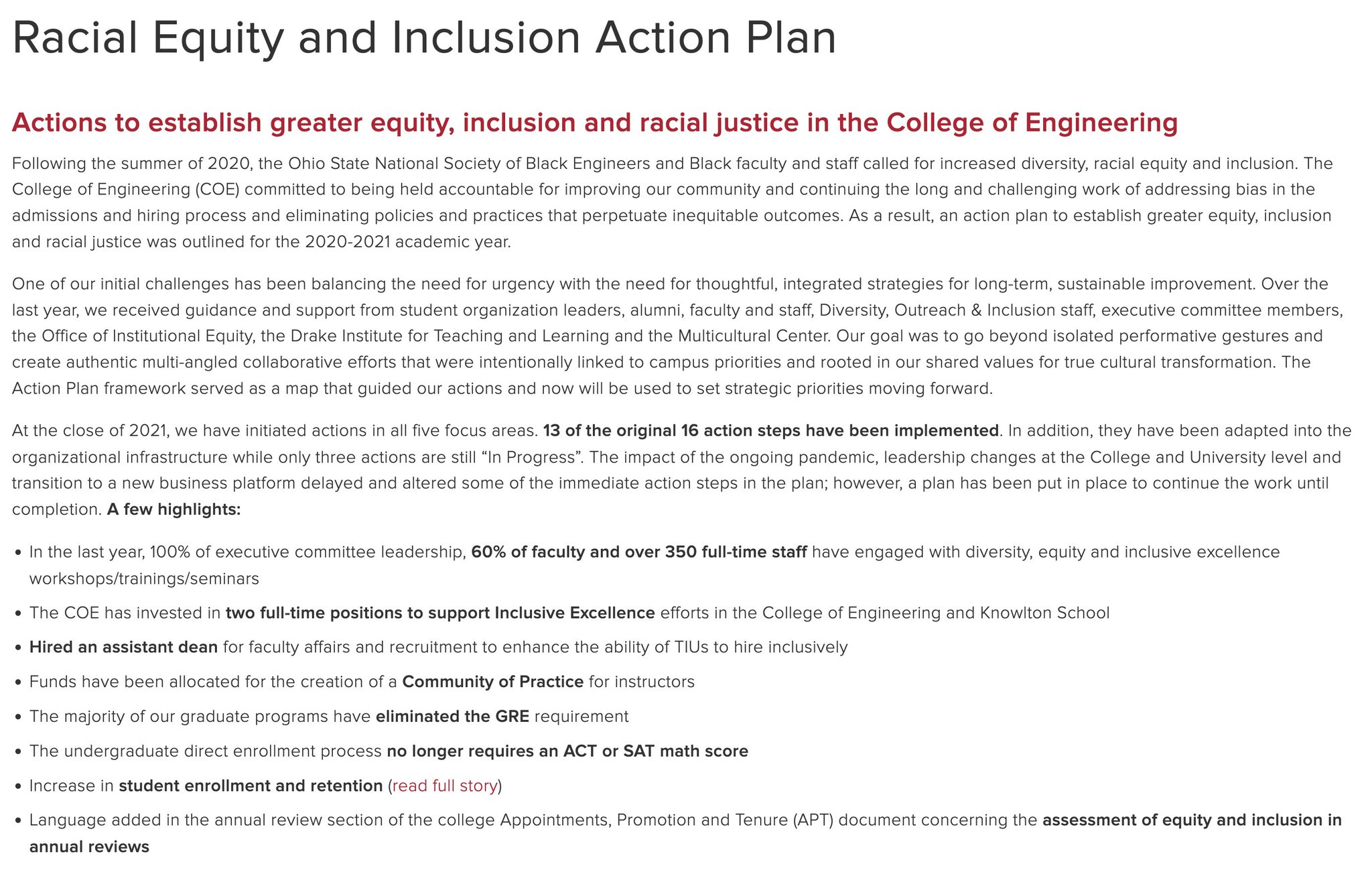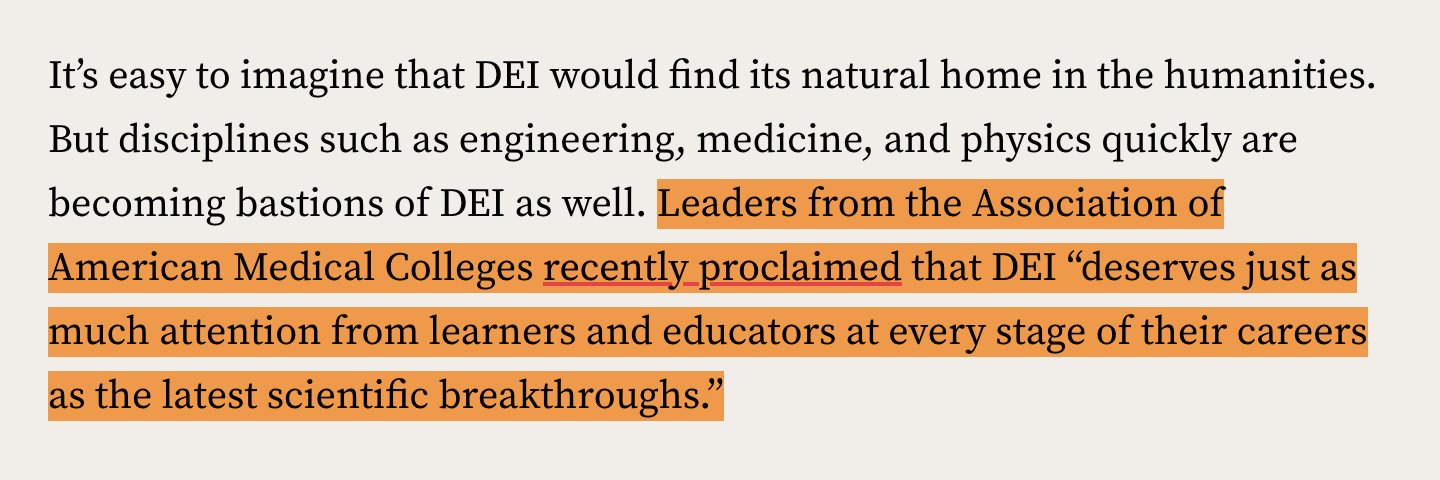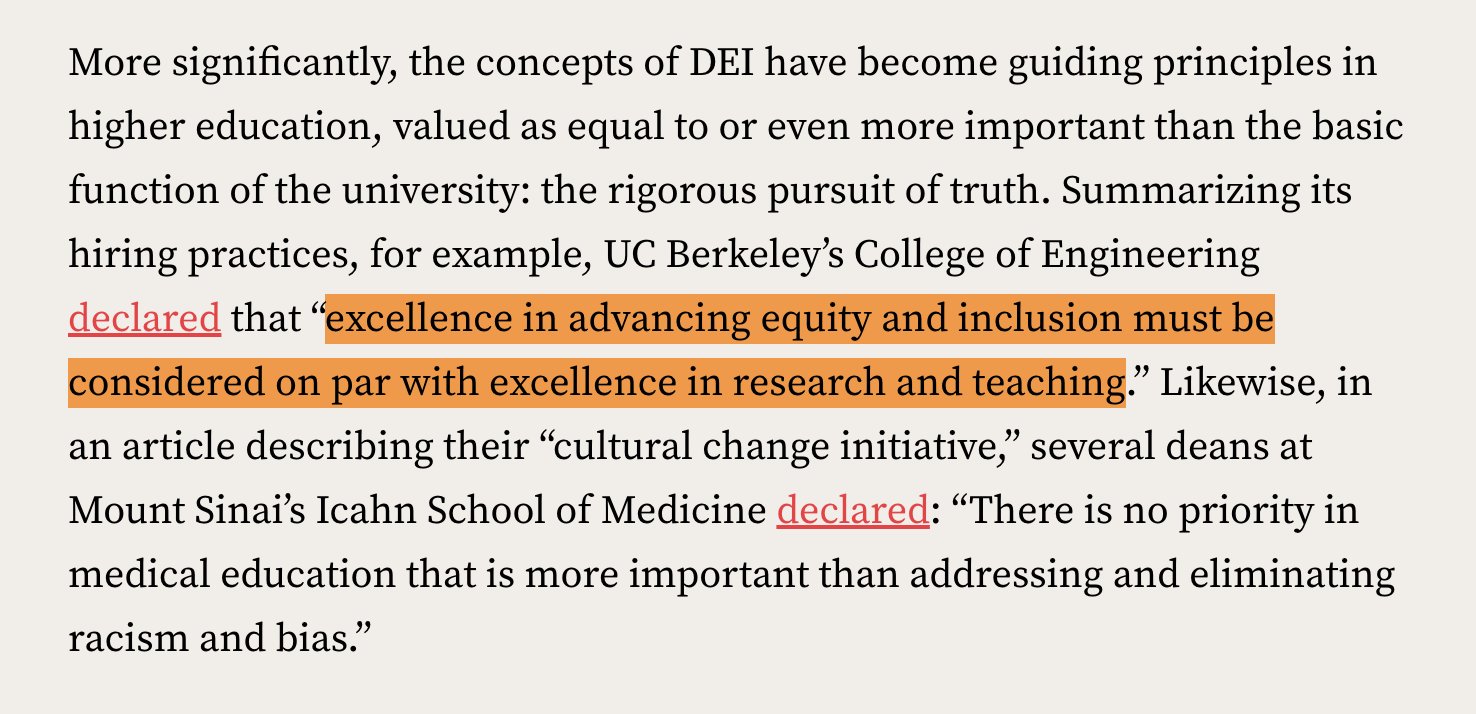Thread
THREAD: Since the UNC Board of Governors proposed (effectively) ending diversity statements, a few critics have made arguments either in favor of DEI statements or DEI more broadly.
Some have argued that I’m overstating my case. For clarity, I want to lay out what I’ve said.
Some have argued that I’m overstating my case. For clarity, I want to lay out what I’ve said.
First, there are dozens of documented cases of institutions explicitly weighing DEI/diversity statements heavily.
Even weighing on par with teaching and research. Many institutions have evaluated diversity statements before anything else in an application.
Even weighing on par with teaching and research. Many institutions have evaluated diversity statements before anything else in an application.
A few examples:
1) The NIH FIRST grant program funds cluster hires at 12 institutions, aiming at roughly 120 new faculty jobs.
The explicit condition for employment through the program, noted in many grant-award announcements, is “a demonstrated commitment to DEI.”
1) The NIH FIRST grant program funds cluster hires at 12 institutions, aiming at roughly 120 new faculty jobs.
The explicit condition for employment through the program, noted in many grant-award announcements, is “a demonstrated commitment to DEI.”
2) UC Berkeley’s Life Sciences initiative, which involved multiple hires, began by cutting the applicant pool from 893 to 214 based solely on the candidates’ diversity statements.
This has served as an a model followed explicitly by many other institutions.
This has served as an a model followed explicitly by many other institutions.
3) Describing a recently search, Emory University biologists department says they weighed DEI, teaching, and research equally, publishing this notable figure to illustrate the point.
TTU’s biology department recently passed a resolution saying it would heavily weigh DEI.
TTU’s biology department recently passed a resolution saying it would heavily weigh DEI.
4) Oregon Health and Science University’s School of Medicine recently promised to:
"Include a section in promotion packages where faculty members report on the ways they are contributing to improving DEI, anti-racism and social justice.”
"Include a section in promotion packages where faculty members report on the ways they are contributing to improving DEI, anti-racism and social justice.”
And I'll note, you can't say that this is just a formality, or that it's ultimately inconsequential.
The school's DEI plan literally promises to "Reinforce the importance of these efforts by establishing clear consequences and influences on promotion packages."
The school's DEI plan literally promises to "Reinforce the importance of these efforts by establishing clear consequences and influences on promotion packages."
5) The California Community Colleges system—the largest system of higher education in the country—passed a resolution mandating that all employees by evaluated for their DEI competencies.
See a few example competencies below.
See a few example competencies below.
Second, the evaluation of diversity statements is often explicitly ideological, as is made evident by the rubrics that universities openly provide.
Here are a few examples of those rubrics.
Here are a few examples of those rubrics.
1) UC Berkeley's Rubric for Assessing Candidate Contributions to Diversity, Equity, Inclusion, and Belonging, which punishes candidates for stating their intent to “treat everyone the same.”
See highlights in the screenshot for other, uh, notable features.
See highlights in the screenshot for other, uh, notable features.
I can hardly find anyone who will defend this rubric, it being so obviously loaded. Yet, it's adapted, copied, and recommended by universities across the country.
Including Vanderbilt, Columbia, UC Irvine, Cornell, Princeton, CalTech, and Michigan State University.
Including Vanderbilt, Columbia, UC Irvine, Cornell, Princeton, CalTech, and Michigan State University.
2) The University of Colorado Denver rubric.
According to which, candidates get three points for espousing the "Golden Rule," but five points for espousing the "Platinum Rule." And for a "Strong recognition of [one's] own privilege."
According to which, candidates get three points for espousing the "Golden Rule," but five points for espousing the "Platinum Rule." And for a "Strong recognition of [one's] own privilege."
3) And I'll be writing more about this soon, the Emory University Rubric, which rewards an understanding of "intersectionality," engaging in "community activism," and adopting a distinctly Kendian understanding of "antiracism."
The Emory Rubric is truly a sight to behold.
And the above are only the rubrics that are publicly available, some of which still required digging on my part.
There are more. And I'll soon start releasing some that I've acquired via FIOA requests, which tell the same story.
And the above are only the rubrics that are publicly available, some of which still required digging on my part.
There are more. And I'll soon start releasing some that I've acquired via FIOA requests, which tell the same story.
On this point, I'll say that even if universities say they want to avoid political bias, that doesn’t eliminate the likelihood of political bias in practice.
DEI is often interpreted in a distinctly ideological manner, which makes assessing DEI contributions a big problem.
DEI is often interpreted in a distinctly ideological manner, which makes assessing DEI contributions a big problem.
DEI programming very frequently espouses a narrow ideological viewpoint. Here are three examples of DEI programming advocating critical race theory. I’d gladly provide more.
Even if bias isn’t written into the rubric, evaluating DEI contributions invites ideological screening.
Even if bias isn’t written into the rubric, evaluating DEI contributions invites ideological screening.
That's UT Austin, Michigan Medicine, and UNC Gillings School of Public Health, just for reference.
It's not plausible to say that DEI is totally neutral when DEI trainings—at UNC-Chapel Hill—ask "What ideas do you have for how to integrate CRT in your teaching practice?"
It's not plausible to say that DEI is totally neutral when DEI trainings—at UNC-Chapel Hill—ask "What ideas do you have for how to integrate CRT in your teaching practice?"
Third, DEI offices and committees constitute a considerable bureaucratic force within universities. The priority often dictates what is taught, how faculty are hired, and how faculty are trained.
A few notes on this point:
1) I would be very skeptical of the judgement of anyone who looks at these numbers and says "this is no big deal."
Sure, universities spend a lot more money on other things, but this is enough to fund whole departments.
1) I would be very skeptical of the judgement of anyone who looks at these numbers and says "this is no big deal."
Sure, universities spend a lot more money on other things, but this is enough to fund whole departments.
My argument has never been that DEI officers get more funding than other facets of the universities.
After all, they don't have to. At a lot of institutions, the priority is being embedded into the basic job of faculty and academic departments.
After all, they don't have to. At a lot of institutions, the priority is being embedded into the basic job of faculty and academic departments.
2) To that point, many universities have mandated DEI committees, and diversity action plans, that push the work of DEI officers onto academic departments and individual faculty members.
E.g. the University of Tennessee at Knoxville.
E.g. the University of Tennessee at Knoxville.
Many departments also voluntarily create DEI plans.
To give just one example, Ohio State University's "Racial Equity and Inclusion Action Plan," which adds DEI considerations into faculty annual review, eliminates the GRE, and eliminates the SAT/ACT Math requirements.
To give just one example, Ohio State University's "Racial Equity and Inclusion Action Plan," which adds DEI considerations into faculty annual review, eliminates the GRE, and eliminates the SAT/ACT Math requirements.
3) The themes of diversity, equity, inclusion, anti-racism, and social justice are now simply written into a huge number of new faculty jobs.
(This is also a direct result of DEI initiative, which I will explain in an upcoming report.)
(This is also a direct result of DEI initiative, which I will explain in an upcoming report.)
4) As I've pointed out before, and as I'll explain further in an article coming out on Friday, many accreditors require ongoing DEI programming as a condition for good standing.
This is actually what lead directly to OHSU's DEI plan, referenced above.
city-journal.org/medical-school-accreditation-body-solicits-dei-initiatives
This is actually what lead directly to OHSU's DEI plan, referenced above.
city-journal.org/medical-school-accreditation-body-solicits-dei-initiatives
5) Plus, institution heads are often unequivocal about how DEI is a top priority.
The leaders of the Association of American Medical Colleges: DEI “deserves just as much attention from learners and educators at every stage of their careers as the latest scientific breakthroughs”
The leaders of the Association of American Medical Colleges: DEI “deserves just as much attention from learners and educators at every stage of their careers as the latest scientific breakthroughs”
Dean of Mount Sinai Medical School: “There is no priority in medical education that is more important than addressing and eliminating racism and bias.”
UC Berkeley Engineering: "advancing equity and inclusion must be considered on par with excellence in research and teaching."
UC Berkeley Engineering: "advancing equity and inclusion must be considered on par with excellence in research and teaching."
In sum, to reach the conclusion that DEI is a major priority in higher ed, all you have to do is take the leaders of colleges and universities at their word.
To see that DEI entails explicit ideological commitments, just read university documents.
To see that DEI entails explicit ideological commitments, just read university documents.
And all you have to do is pay attention to university policies to see that DEI statements are weighed heavily in for many faculty jobs.
Mentions
See All
Geoffrey Miller @primalpoly
·
Jan 23, 2023
A long, informative thread on how US universities are using 'Diversity, Equity, Inclusion' statements to hire only faculty who conform to trendy leftist political ideologies. (Which, at public universities, is an unconstitutional form of 'compelled speech')
